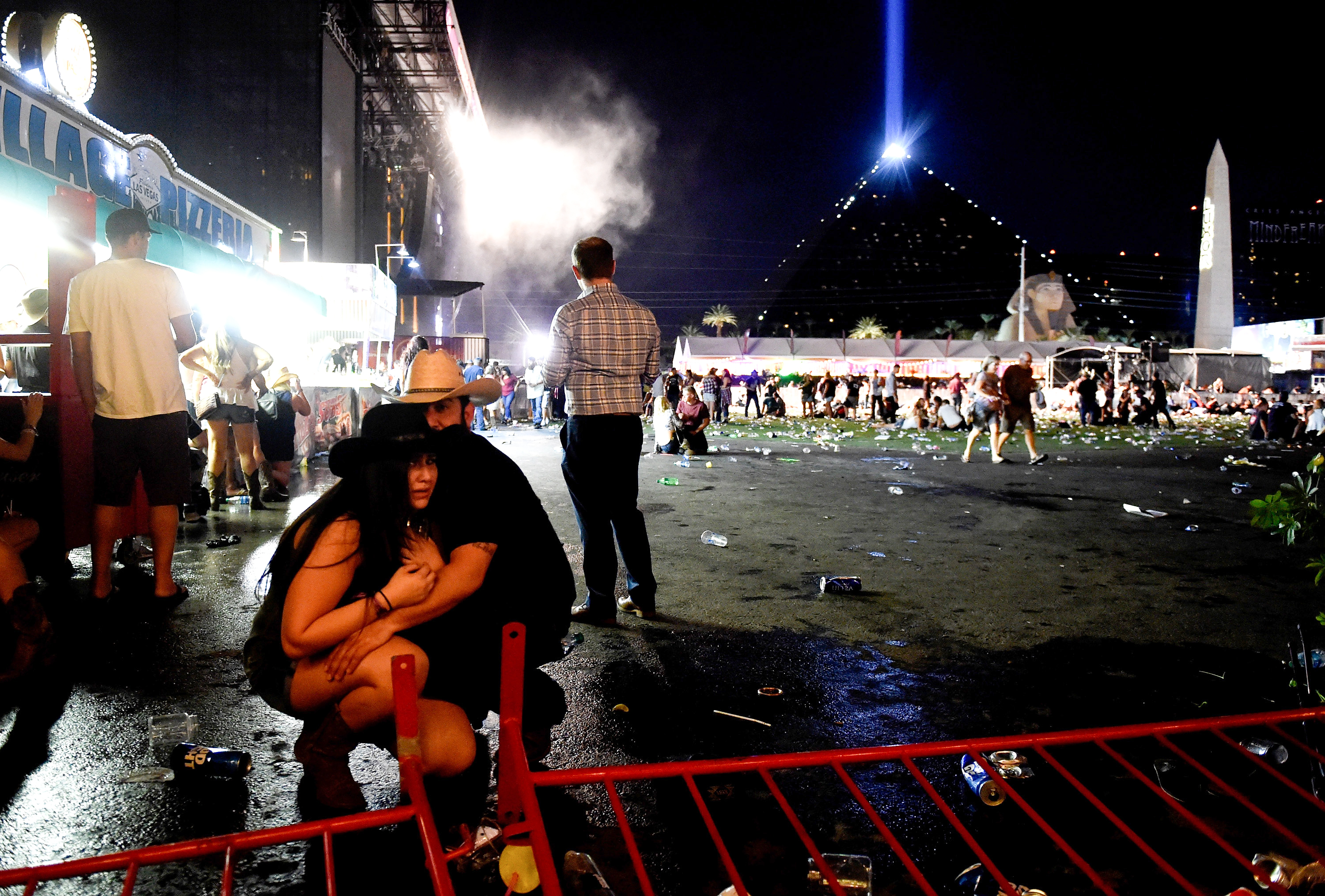Was the Las Vegas shooter a terrorist?
What we talk about when we talk about mass shootings


A free daily email with the biggest news stories of the day – and the best features from TheWeek.com
You are now subscribed
Your newsletter sign-up was successful
There's one term that uniformly fits Stephen Paddock, the deceased suspect in the deadliest mass shooting in modern American history, and that's "mass murderer." But as we search for meaning behind an atrocity that has raised the bar on the levels of depravity people can inflict on each other, the many other labels applied to Paddock — like "terrorist" — will have wide-reaching implications. And we should all be judicious before throwing around terms that have enormous political consequences.
We know Paddock was white, retired, and had no criminal record or known history of mental illness. His dumbfounded brother told reporters "he was just a guy," someone who had never expressed any passion for politics or religion, nor did he appear to be someone obsessed with guns or harboring a murderous rage. He was unmarried and living in a retirement community. That Paddock — who was fond of both country music and gambling — chose a country music festival outside of a Las Vegas casino hotel as his killing ground is the only set of dots that appear to connect at the moment.
For many, it's an insult to the dead and a mark of white privilege to label Paddock as a mere "shooter" or "gunman." They argue — with good evidence to back it up — that if Paddock's skin was darker, or if he were a Muslim, or if he had a history of extreme politics, Paddock would be branded a "terrorist" without a second thought.
The Week
Escape your echo chamber. Get the facts behind the news, plus analysis from multiple perspectives.

Sign up for The Week's Free Newsletters
From our morning news briefing to a weekly Good News Newsletter, get the best of The Week delivered directly to your inbox.
From our morning news briefing to a weekly Good News Newsletter, get the best of The Week delivered directly to your inbox.
And indeed, according to Nevada state law, Paddock's act, which caused "great bodily harm or death to the general population," qualifies as terrorism because Nevada doesn't require a political motivation to label it as such. Although the Islamic State claims Paddock converted to Islam within the past year and carried out the atrocity in its name, senior U.S. officials are skeptical, and the Islamist group infamous for its own craven brutality has provided no evidence to back up its claim.
If Paddock does turn out to be just a "lone angry white guy" who snapped, most Americans probably won't view him as a terrorist. Instead, the political fallout from the tragedy will likely be focused exclusively on gun control, and perhaps mental illness. However, should Paddock be revealed to have had any affiliation with Islamic extremists, it would not be hard to imagine such information being used as a pretext for a massive crackdown on civil liberties, as well as escalation of foreign military conflict, all in the name of combating "terrorism."
The "terrorist" label is extremely powerful in American politics. It must be used carefully.
We've seen this before. From post-9/11 warrantless surveillance, to Boston being placed under de facto martial law following the Boston marathon bombing, to the FBI's attempt to strong-arm Apple into unlocking the San Bernardino shooter's iPhone, to President Trump's travel ban on a number of Muslim-majority countries he dubiously deemed a terror threat, something about the "T word" makes our reactions to atrocities both political and massively disproportionate.
A free daily email with the biggest news stories of the day – and the best features from TheWeek.com
Beyond just the "thoughts and prayers" offered to the families of victims of an inexplicable mass shooting by a "lone wolf" — which are almost always eventually shrugged off as just another run-of-the-mill American tragedy — the specter of terrorism jacks up the stakes exponentially. Just as distressingly, these "anti-terror" initiatives have a tendency of being popular regardless of their effectiveness or constitutionality — no matter which political party is in power — as Americans in the wake of a tragedy tend to prefer "doing something" to "thinking through the unintended consequences of doing something."
The death toll from the Las Vegas massacre has already eclipsed the previous U.S. record for mass murder by firearm — when 49 people were killed in the 2016 mass shooting at the Pulse nightclub in Orlando, Florida. Because that atrocity was carried out by a Muslim with extremist views, it was widely described as "terrorism." Or was it a "hate crime" because of the perpetrator's views on gays and the fact that he chose a gay nightclub during Pride week as his venue for the wanton destruction of human beings? Or was his a "mental health issue" because you obviously have to be insane to kill strangers in a suicide mission?
One could argue that the application of all of these terms is mere semantics. They don't bring the dead back to life and act mostly in the service of "politicizing a tragedy." But it's more than that.
It might feel like social justice for the despicable dead white male suspected mass murderer Paddock to be called a "terrorist," but that's a fool's bargain. In a 2015 article at The Intercept, Glenn Greenwald wrote that the unwillingness of many to label the racist Charleston church shooter Dylann Roof a "terrorist" was more evidence that "terrorism" is "a completely malleable, manipulated, vapid term of propaganda that has no consistent application whatsoever." The use of the term itself comes with consequences which often exacerbate tragedies and create new injustices like suspicion-less dragnets and ill-considered wars.
There's no question Paddock willfully unleashed terror. But that doesn't make him a terrorist — at least not the way the word is used in the popular imagination and American politics. And of all the "national conversations" to be sparked by this horror, the wisdom of using the word "terror" to elevate some crimes above others is one we would be wise to reconsider.
Anthony L. Fisher is a journalist and filmmaker in New York with work also appearing at Vox, The Daily Beast, Reason, New York Daily News, Huffington Post, Newsweek, CNN, Fox News Channel, Sundance Channel, and Comedy Central. He also wrote and directed the feature film Sidewalk Traffic, available on major VOD platforms.
-
 Political cartoons for February 20
Political cartoons for February 20Cartoons Friday’s political cartoons include just the ice, winter games, and more
-
 Sepsis ‘breakthrough’: the world’s first targeted treatment?
Sepsis ‘breakthrough’: the world’s first targeted treatment?The Explainer New drug could reverse effects of sepsis, rather than trying to treat infection with antibiotics
-
 James Van Der Beek obituary: fresh-faced Dawson’s Creek star
James Van Der Beek obituary: fresh-faced Dawson’s Creek starIn The Spotlight Van Der Beek fronted one of the most successful teen dramas of the 90s – but his Dawson fame proved a double-edged sword
-
 The billionaires’ wealth tax: a catastrophe for California?
The billionaires’ wealth tax: a catastrophe for California?Talking Point Peter Thiel and Larry Page preparing to change state residency
-
 Bari Weiss’ ‘60 Minutes’ scandal is about more than one report
Bari Weiss’ ‘60 Minutes’ scandal is about more than one reportIN THE SPOTLIGHT By blocking an approved segment on a controversial prison holding US deportees in El Salvador, the editor-in-chief of CBS News has become the main story
-
 Has Zohran Mamdani shown the Democrats how to win again?
Has Zohran Mamdani shown the Democrats how to win again?Today’s Big Question New York City mayoral election touted as victory for left-wing populists but moderate centrist wins elsewhere present more complex path for Democratic Party
-
 Millions turn out for anti-Trump ‘No Kings’ rallies
Millions turn out for anti-Trump ‘No Kings’ ralliesSpeed Read An estimated 7 million people participated, 2 million more than at the first ‘No Kings’ protest in June
-
 Ghislaine Maxwell: angling for a Trump pardon
Ghislaine Maxwell: angling for a Trump pardonTalking Point Convicted sex trafficker's testimony could shed new light on president's links to Jeffrey Epstein
-
 The last words and final moments of 40 presidents
The last words and final moments of 40 presidentsThe Explainer Some are eloquent quotes worthy of the holders of the highest office in the nation, and others... aren't
-
 The JFK files: the truth at last?
The JFK files: the truth at last?In The Spotlight More than 64,000 previously classified documents relating the 1963 assassination of John F. Kennedy have been released by the Trump administration
-
 'Seriously, not literally': how should the world take Donald Trump?
'Seriously, not literally': how should the world take Donald Trump?Today's big question White House rhetoric and reality look likely to become increasingly blurred
